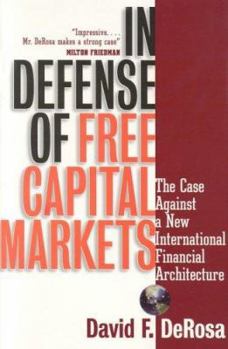In Defense of Free Capital Markets: The Case Against a New International Financial Architecture
This book analyses the economic conditions that produced a number of recent financial crises. It also investigates the responses made to each crisis, to uncover whether government policies directed at these episodes of turmoil made matters better or worse. Before constructing new regulations, economists should carefully examine the results of past policy. Many fixed-exchange-rate regimes have failed in their intended purpose of maintaining stability...
Format:Hardcover
Language:English
ISBN:157660036X
ISBN13:9781576600368
Release Date:January 2001
Publisher:Bloomberg Press
Length:240 Pages
Weight:1.40 lbs.
Dimensions:0.9" x 6.4" x 9.6"
Customer Reviews
5 ratings
Accolades from Milton Friedman
Published by Thriftbooks.com User , 23 years ago
"In Defense of Free Capital Markets is an impressive survey and analysis of the crises of the 1990s. Mr. DeRosa makes a strong case that official intervention has made matters worse, not better, and that in such instances it is far better to leave it to the invisible hand of the market than to the clumsy, visible hand of regulators." --Milton Friedman Senior Research Fellow, Hoover Institution Nobel Economics Prize, 1976
Common Sense for Currency Buffs
Published by Thriftbooks.com User , 23 years ago
Professor DeRosa offers up a generous helping of reality in evaluating the currency crises of the past dozen or so years. From the first world foibles of the Bank of Japan to the third world of currency pegs, the currency calamities of the late twentieth century are thoughtfully presented in a lean read. While perhaps giving short shrift to the political constraints facing policy makers in times of crisis, Mr. DeRosa nevertheless does well describing the environments and pre-conditions which ultimately fostered our most recent international financial catastrophes. In this, the age of fiat money, unsustainable currency policies are easy prey for the worlds biggest market. Anyone interested in a brief but informative history of recent currency debacles will truly enjoy this book.
Highly Recommended!
Published by Thriftbooks.com User , 23 years ago
Yale University adjunct professor David F. DeRosa argues that markets are smarter than government ministries. Therefore, he contends, economic development should be left to the free market, since tighter regulations will only distort development. His detailed analysis of economic conditions focuses on factors leading to several crises, including the decline of the Mexican and Japanese economies in the 1990s and the Southeast Asian collapse of 1997. The subject is complicated and interesting, and the writing is often technical and sometimes complex. We at getAbstract call this book to the attention of scholars, executives and managers who have a serious interest in fiscal policy. And we do mean serious.
Free Capital Markets -- The Road to Prosperity
Published by Thriftbooks.com User , 23 years ago
This work is illuminating and speaks to issues beyond the world of finance, like politics and ideaology. DeRosa lays out clear and consice arguments in defense of free floating exchange rates and against fixed exchange-rate regimes. The author debunks the propaganda supporting fixed exchange-rate regimes with insightful analyses based on the facts of the various currency crises that occured during the 1990s. Particularly interesting is the fact that leaders around the world are either ignorant of or chose to ignore the last ten (let alone the last 100) years worth of economic history and persist in attempting to control and plan economies. This book should be required reading not only for finance professionals and central bankers, but anyone interested in how the decisions of people in appointed positions (like the head of a central bank or finance ministry)have far-reaching and often dire consequences.
Worth Reading
Published by Thriftbooks.com User , 23 years ago
This is a book well worth reading. You may not agree with everything position the author takes, but if you want to understand the nature of financial and currency crises, you should read this book. It provides an interesting chronology of the crises of the 1990s and presents the free market side of the argument about the genesis of these crises cogently and effectively.It also presents an interesting perspective--that these crises are often caused by policy mistakes by the governments of the crisis countries. The argument is well documented and, while it is mostly likely not the only factor in play, it is one that is underappreciated in the literature.Perhaps the most important contribution of this book is the emphasis that it places on the importance of exchange rate policy in a country's macroeconomic policy decisions. Mr. DeRosa has correctly pointed out that there is a troubling correlation between the nature of the exchange rate regime and the incidence of crisis.Mr. DeRosa has written a useful and timely book that should be read by anyone interested in understanding how the global economy works (or, as is often the case, doesn't work).





